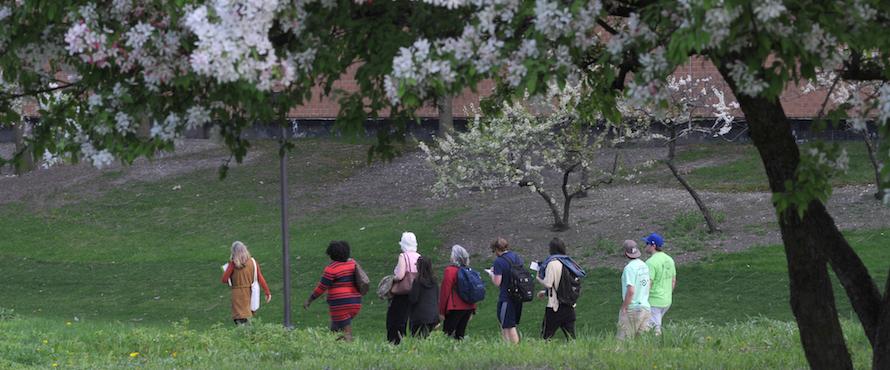Northeastern Illinois University’s College of Arts and Sciences will offer more than 60 courses that in some way address the issue of climate change during the Spring 2020 semester.
Confronting Climate Change, Transforming Cultures is a faculty-driven initiative that spans disciplines from the arts to the natural sciences. Initial conversations about the themed semester began in the dean's office of the College of Arts and Sciences with Associate Dean Sudha Srinivas, Interim Dean Katrina Bell-Jordan and Acting Associate Dean Tim Libretti, who'd watched the film “Cooked: Survival by Zip Code” over the summer. Then this fall, Christopher Schroeder in the English Department worked with the Albany Park branch of the Chicago Public Library on programming for the One Book, One Chicago selection, “The Sixth Extinction” by Elizabeth Kolbert. As Libretti and Schroeder discussed these works, it became more apparent that themed semester on climate change could be beneficial to students and the community. Other members of the College of Arts and Sciences faculty and the dean's office agreed.
“As the College of Arts and Sciences at a regional, comprehensive, public university, we’re supposed to serve the region,” Libretti said. “We’re supposed to take part in being a resource for our region by helping to address and solve problems in the area to improve lives.”
In 2014, the College of Arts and Sciences put together a themed semester called Reimagining Food, which dealt with issues such as the politics of food and hunger. Libretti noted that at the time the University was trying to address issues of student hunger and food insecurity. Some of the lasting impacts of that semester were a heightened visibility of the Student Food Pantry, the introduction of the community garden near Northeastern’s tennis courts and courses such as the Psychology of Food.
“The issue of climate change had really been coming up a lot,” Libretti said. “Many of the courses offered may have already had a climate change component. We decided that, in creating the theme semester, we could bring these courses together in a coherent form to develop a larger University or community conversation about it in an intentional, very visible way.”
Seventy percent of departments in the College of Arts and Sciences are participating in the themed semester through course offerings. Libretti is hopeful that several University and community events will take place as part of this program as well, including a screening of “Cooked: Survival by Zip Code,” which examines the record-breaking Chicago heatwave of 1995 and the lives that were lost not just because of the heat, but because of the poverty that is prevalent on the city’s South and West Sides.
“All disciplines, in many ways, can be brought to bear on the issue to help us understand it and find creative ways to address it,” Libretti said.
The effort may not be limited to just this semester. Libretti said at least two departments are collaborating on the exploration of a climate change certificate program. Just as it did with the Reimagining Food initiative, the College may also look to establish long-lasting community partnerships related to the topic.
“We have a responsibility to be useful,” Libretti said. “A lot of times people don’t see the utility of the arts and sciences and ask, ‘What does a course on public speaking or drawing or web development have to do with climate change?’ Well, you still need these skills to be able to communicate with people, frame issues for people in ways they can understand, and persuade people on the importance of issues to develop ways to address them creatively.”
Libretti highlighted the importance of courses such as Advanced Immunology because climate change affects people’s immune systems, as well as the course Disaster Policy and Politics because climate change impacts the practice of emergency and disaster management.
“These courses exist outside of the issue of climate change, but climate change impacts everything we’re doing in the world,” Libretti said. “It impacts every area of our lives right now. So it stands to reason that every discipline has something to contribute to address this issue. There’s a sociological approach to climate change. There’s a political approach. There’s the science of it, narratives and stories about climate change that can help us understand climate change and the world in more effective ways.”
Registration for Spring 2020 is now open. A complete list of courses being offered as part of Confronting Climate Change is online. Events programming will be announced as it is scheduled.








